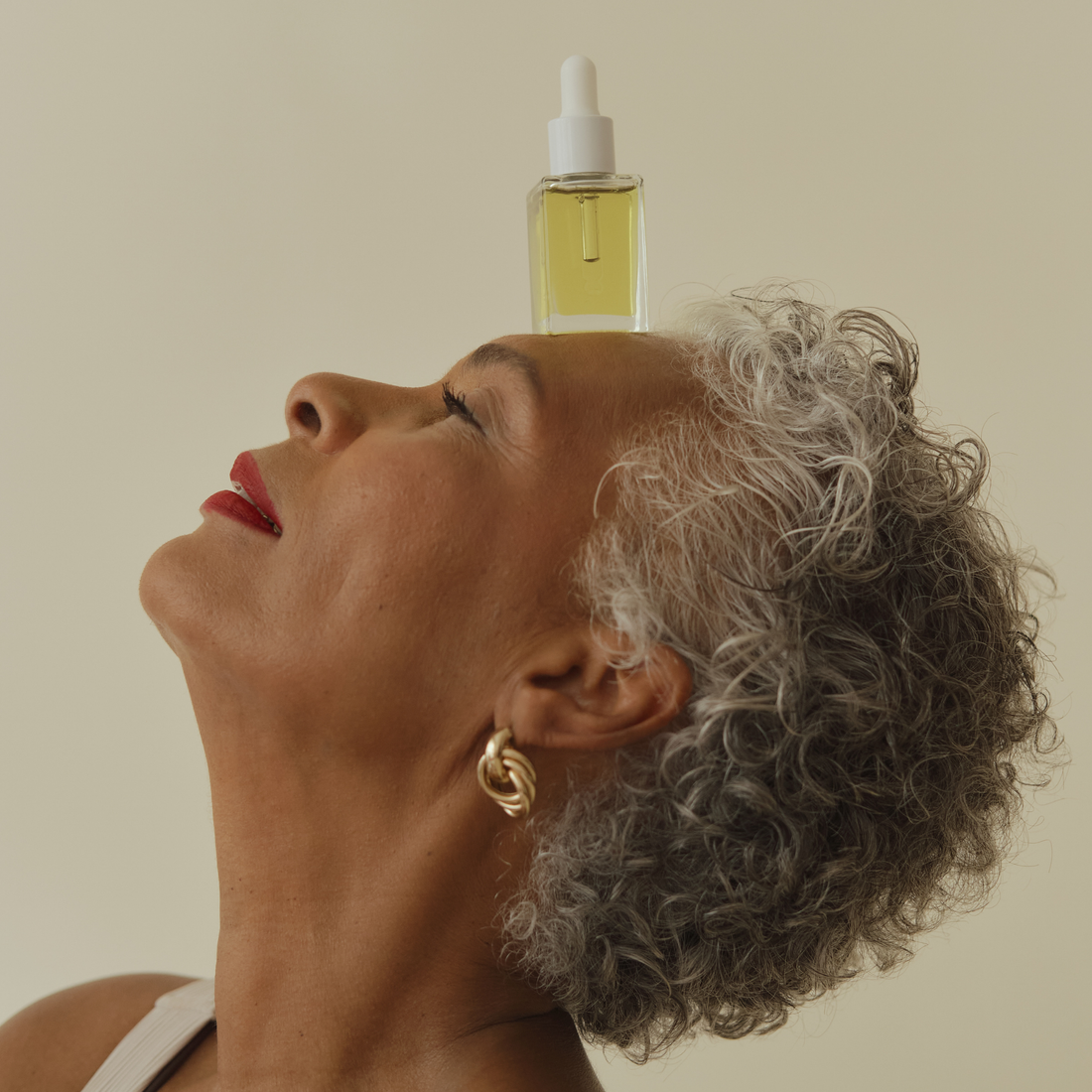
The Effects of Hormones on Aging
Share
How Hormonal Changes Impact Your Skin and Health
Hormones play a crucial role in maintaining various bodily functions, from metabolism and reproductive health to mood regulation and skin vitality. As we age, hormone levels fluctuate and can significantly impact the appearance and health of our skin. Understanding the relationship between hormones and skin aging can help individuals make more informed decisions about skincare and overall health. Here’s a look at how hormones influence skin problems and the aging process.
Estrogen: The Skin's Best Friend (and a Key Factor in Aging)
Estrogen, the primary female sex hormone, is widely recognized for its positive effects on the skin, especially during the reproductive years. It helps maintain skin elasticity, moisture, and overall texture by promoting collagen production—the key protein that gives skin its firmness and structure. Estrogen also supports the skin's ability to retain water, keeping it plump and hydrated.
However, as women age, particularly during perimenopause and menopause (typically around age 45 to 55), estrogen levels decline. This reduction has a direct effect on the skin, leading to visible signs of aging, such as:
- Thinning skin: Reduced estrogen means less collagen production, making skin more fragile and prone to wrinkles.
- Decreased moisture: Skin becomes drier as the hormone’s ability to stimulate oil production decreases.
- Loss of elasticity: Without sufficient estrogen, the skin loses its firmness, leading to sagging and the formation of fine lines and wrinkles.
- Age spots and pigmentation: Lower estrogen levels can trigger pigmentation changes, such as age spots or hyperpigmentation, which are common in post-menopausal women.
To counteract these effects, women can consider hormone replacement therapy (HRT), which can help replenish estrogen levels. Additionally, using skincare products with ingredients like retinoids, peptides, and hyaluronic acid can help stimulate collagen production and improve skin hydration.
Testosterone: Balancing Oil Production and Acne
Testosterone is typically thought of as a male hormone, but women also produce it in smaller amounts. Testosterone plays a vital role in stimulating oil production in the skin, which can be both beneficial and problematic.
- Increased oil production: During puberty and early adulthood, testosterone levels are higher, which can cause the sebaceous (oil) glands to become more active. This is a reason why many people experience acne during their teenage years, particularly on the face, chest, and back.
-
Hormonal imbalances: As individuals age, testosterone levels naturally decrease. However, imbalances can occur, particularly during perimenopause and menopause, leading to various skin problems. For example, some women may experience an increase in oil production, which can trigger acne outbreaks, particularly along the jawline and chin.
- Conversely, if testosterone levels become too low, it can contribute to thinning skin and a decrease in muscle tone, leading to sagging and the appearance of fine lines.
In cases of acne caused by hormonal imbalance, treatments may include hormonal therapies or topical medications that target oil production, such as oral contraceptives or anti-androgen medications (like spironolactone).
Progesterone: The Skin’s Calm Protector
Progesterone, another key female hormone, plays a subtle but important role in skin health. It helps balance the effects of estrogen by acting as an anti-inflammatory agent. However, fluctuations in progesterone levels—such as during the menstrual cycle, pregnancy, or menopause—can influence the skin in several ways:
- Acne flare-ups: Elevated progesterone levels, particularly in the second half of the menstrual cycle, can lead to the increased production of sebum (oil), contributing to clogged pores and acne. This is often seen in women around their periods or during pregnancy.
- Skin sensitivity: Fluctuating progesterone levels can also make the skin more sensitive, potentially leading to rashes or irritation.
Managing hormonal fluctuations can often help alleviate some of these skin issues. For instance, using anti-inflammatory skincare products like those containing niacinamide can help calm inflamed skin, while products like salicylic acid can help keep pores clear.
Thyroid Hormones: Skin Texture and Elasticity
Thyroid hormones (T3 and T4) regulate metabolism, energy levels, and many other bodily functions, including skin health. Both an underactive (hypothyroidism) or overactive (hyperthyroidism) thyroid can have significant effects on the skin.
- Hypothyroidism: When the thyroid is underactive, it can lead to dry, flaky skin, and the skin may appear dull and lackluster. People with hypothyroidism may also notice increased sensitivity to cold and slower wound healing. The skin may lose its elasticity, leading to premature sagging.
- Hyperthyroidism: An overactive thyroid can lead to thinner, more delicate skin, as well as increased sweating. People with hyperthyroidism may also experience frequent acne flare-ups or oily skin.
Correcting thyroid imbalances through medication or other treatments can help improve the condition of the skin, along with using hydrating and soothing skincare products to restore moisture and balance.
Cortisol: Stress and Skin Aging
Cortisol, often called the "stress hormone," is produced by the adrenal glands in response to stress. While cortisol is vital in the short term for managing stress, prolonged high levels can have harmful effects on the skin, especially as we age.
- Collagen breakdown: Chronic stress and elevated cortisol levels can break down collagen and elastin in the skin, leading to wrinkles and sagging. Over time, this accelerates the visible signs of aging.
- Skin inflammation: High cortisol levels can also trigger inflammation, exacerbating conditions like acne, eczema, and rosacea. Additionally, stress can disrupt the skin's natural barrier, making it more vulnerable to environmental damage and irritation.
Managing stress through mindfulness practices, exercise, and proper skincare can help combat the effects of cortisol on the skin. Topical antioxidants like Vitamin C and anti-inflammatory ingredients can also protect the skin from oxidative stress.
______________________________________________
Hormones are powerful influencers of skin health, and their effects on aging and skin problems are undeniable. Whether it's the decrease in estrogen leading to dry, thinner skin, the fluctuation in testosterone contributing to acne, or the stress-induced breakdown of collagen from high cortisol levels, hormones play a significant role in the way our skin ages and reacts to external stimuli.
By understanding the connection between hormones and skin health, individuals can make better choices when it comes to managing aging and skin problems. Consulting with a dermatologist, endocrinologist, or healthcare provider to assess hormonal imbalances can lead to targeted treatments that help restore skin vitality and prevent further damage. With the right approach, it’s possible to achieve healthier, more youthful skin at any stage of life.
